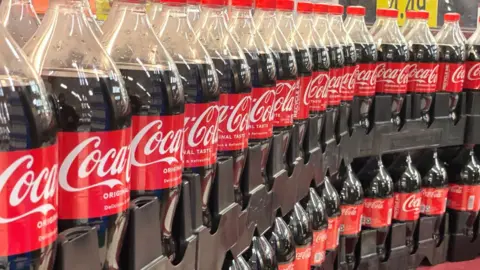In a recent statement that has stirred considerable attention, former President Donald Trump announced via social media that Coca-Cola has agreed to switch its sweetening agent in U.S. drinks from high-fructose corn syrup to real cane sugar. This decision aligns with concerns raised about the health implications tied to the current ingredient. Specifically, Trump’s Health Secretary, Robert F. Kennedy Jr., expressed apprehensions regarding high-fructose corn syrup and its potential risks to consumers’ health.
Trump’s post on Truth Social acknowledged his discussions with Coca-Cola and stated, “I have been speaking to Coca-Cola about using REAL Cane Sugar in Coke in the United States, and they have agreed to do so. I’d like to thank all of those in authority at Coca-Cola.” While Coca-Cola has not officially validated the recipe change, a spokesperson for the company expressed appreciation for Trump’s enthusiasm regarding their products. They hinted at forthcoming announcements about innovative offerings within Coca-Cola’s product line, creating speculation among consumers and industry watchers alike.
This move was characterized by Trump as “a very good move” for Coca-Cola, emphasizing that “It’s just better!” He pointed out that while U.S. Coca-Cola products primarily utilize corn syrup, variations sold in other regions, like Mexico and the United Kingdom, often contain cane sugar. This difference has drawn the attention of many consumers who prefer the flavor profile derived from cane sugar over that from corn syrup.
Coca-Cola CEO James Quincey, during an April conference with investors, discussed the company’s approach towards sugar reduction across its beverages. He highlighted that this effort has been part of broader initiatives to change recipes while leveraging marketing strategies and distribution networks to enhance awareness and interest in their diverse product offerings.
Kennedy, head of the “Make America Healthy Again” movement, has been vocally critical of certain ingredients prevalent in American food products, such as corn syrup, seed oils, and artificial dyes, claiming they are linked to various health issues. He advocates for their removal and plans to initiate updates to national dietary guidelines in the upcoming summer, aiming to combat what he views as a health crisis stemming from poor dietary practices among Americans.
While Trump’s statement has resonated with some consumers who favor health-conscious dietary options, it is also important to note his personal habits. He is known for his preference for Diet Coke, which contains the artificial sweetener aspartame, and even had a button installed on the Resolute Desk in the Oval Office for easy access to the beverage. This juxtaposition of promoting cane sugar for Coca-Cola while personally consuming Diet Coke showcases the complexity of nutritional choices in today’s food landscape.
As the news unfolds, consumers are observing the potential shift in Coca-Cola’s sweetening practices with keen interest, especially as direct discussions and public statements come from high-profile figures like Trump. The anticipated changes might signal a broader industry trend towards prioritizing natural ingredients in response to growing consumer demand for healthier options.
The dialogue around sugar consumption and ingredient transparency is ongoing, and organizations along with health advocates are likely to monitor Coca-Cola’s policy changes closely. How these developments will influence consumer behavior and market dynamics in the beverage sector in America remains to be seen, but it undoubtedly highlights the intersection of health, corporate responsibility, and consumer preference in modern society.











